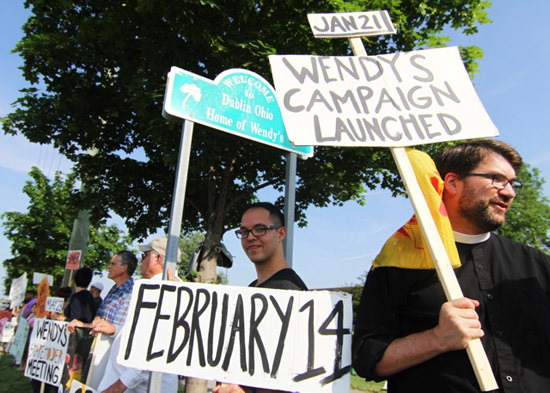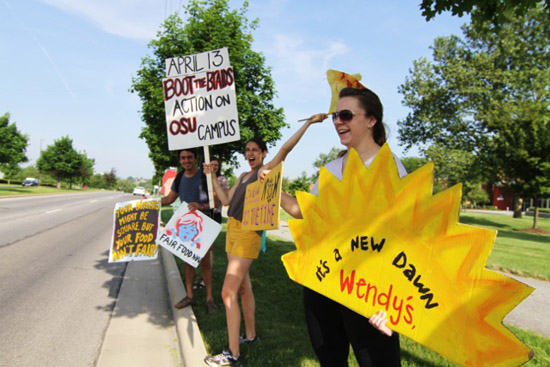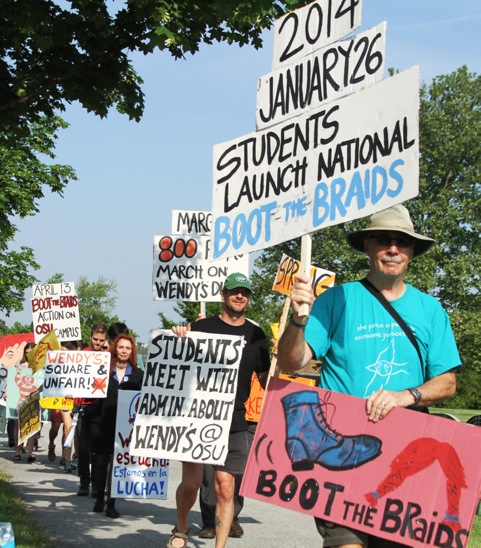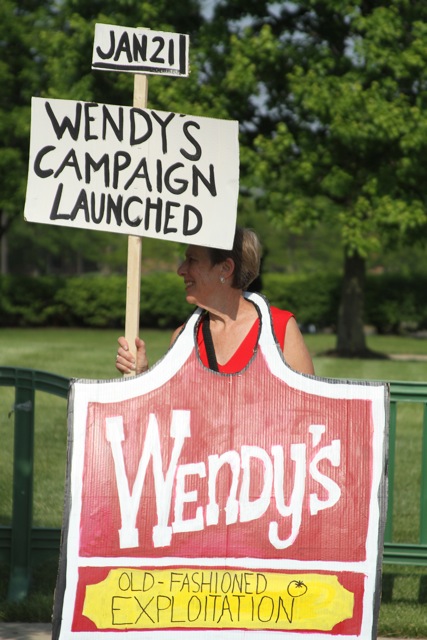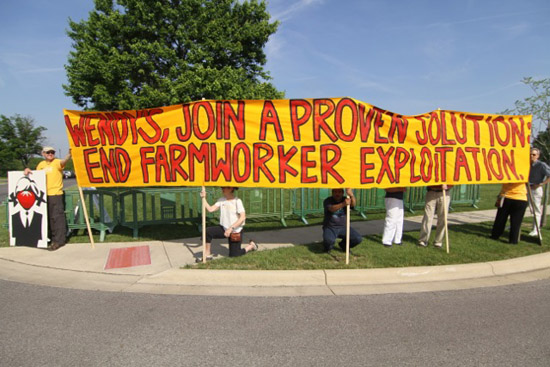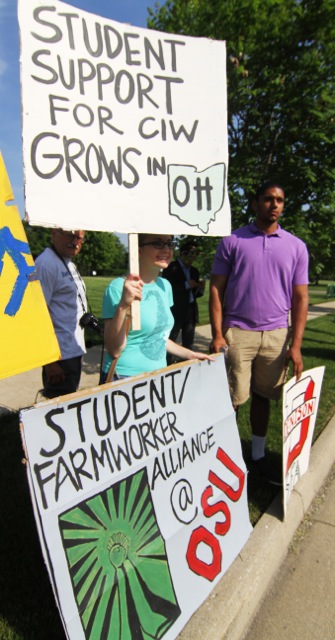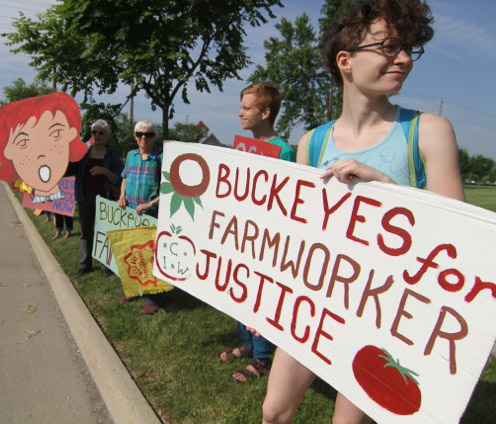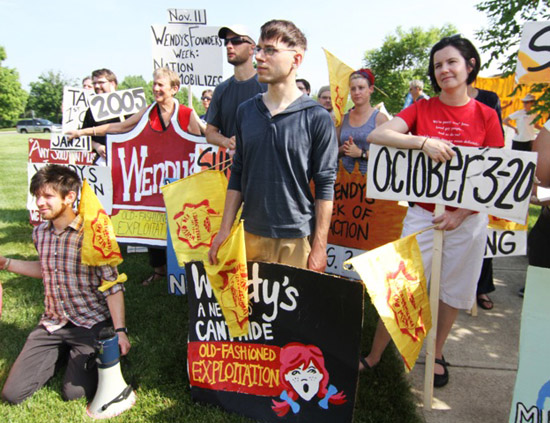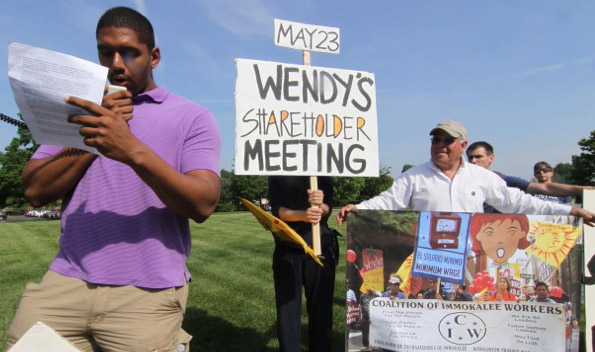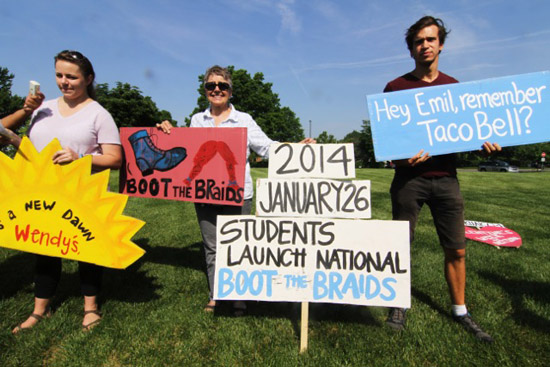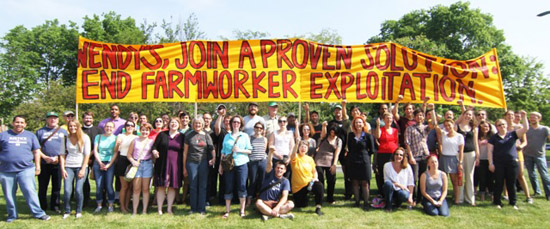[hupso_hide][hupso title=”Wendys frosty! @CIW, alies bring tough questions at #shareholder meeting…” url=”https://ciw-online.org”]
Drama in Dublin… CIW to CEO Emil Brolick: “Why would you deny your shareholders the opportunity for Wendy’s to be part of the premier program for corporate social responsibility in the nation?“
Yesterday morning, the CIW and dozens of members of the amazing Ohio Fair Food joined Wendy’s shareholders, CEO Emil Brolick, and the company’s board of directors at Wendy’s annual shareholder meeting in Dublin, OH for a rare face-to-face encounter between the forces of Fair Food and the executives at the final fast-food hold out. And between the colorful protest outside the meeting and the fireworks inside, where the CIW and its faith and student allies dominated the Q&A session of the agenda, it soon became clear that the company’s leaders are feeling the pressure from the escalating campaign calling on Wendy’s to join the growing Fair Food Program.
Outside the meeting, protesters lined the street leading to Wendy’s corporate headquarters in Dublin with an ingenious visual display: A living timeline of the Wendy’s campaign, from 2005 when the first letter was sent to Wendy’s following the end of the Taco Bell boycott to the present:

The protesters ranks were filled by a wide array of Ohio-based allies, including members of the Cincinnati Interfaith Worker Center, Denison University SFA, Justice Action Ministries, United Students for Fair Trade @ OSU, Central Ohioans for Peace, Central Ohio Peace Network, Summit United Methodist Church, Ohio Student Association, and the University District Freedom School, to name just a few.
Inside the meeting, CEO Emil Brolick faced a formidable team of questioners from the Campaign for Fair Food, including the CIW’s Gerardo Reyes Chavez, Kenyon College’s Nancy Powers representing faith allies, and Ohio State University’s Sarah Stanger representing student allies and the growing Boot the Braids campaign (Gerardo, Professor Powers, right, and Sarah Stanger, left, are pictured here below just before heading inside):

Once the Q&A session began, the tension could be cut with a knife. To do the scene justice, we share with you here below a detailed report of the back and forth, provided by a member of the Fair Food delegation who witnessed the events first-hand. The report is lengthy, as it attempts to capture the full extent of the dialogue, so to break up the long text, we will from time to time throw in a few photos from the amazing protest outside the meeting.
“Next question”…
First up was Gerardo:
My name is Gerardo Reyes. I am a representative of the Coalition of Immokalee Workers.
In 2005, we sent a letter asking Wendy’s to meet higher ethical standards in its tomato supply chain and to pay a very small Fair Food Premium to address workers’ sub-poverty wages. Since then, 90% of Florida’s tomato growers have joined the Fair Food Program, alongside Wendy’s four major competitors, who have recognized the Program as a crucial step to modernize their supply chains.
In January, Walmart joined, putting its weight behind a Program that has been recognized by the UN and the White House. And just last month, the Program was called the “the best workplace-monitoring program in the United States” on the front page of the New York Times. Here is the copy of it.
Without a doubt, the Program has brought most of the Florida tomato industry into the 21st century: eliminating modern-day slavery and greatly reducing sexual harassment, among other things. Eva Longoria, the actress, whose first job was at Wendy’s, recently produced the documentary film Food Chains which focuses on the Fair Food Program. She intends to use the film this fall to raise awareness of the Program and highlight the companies that support it, and those that don’t.
Participating in the Program means committing to cut purchases from growers who violate farmworkers’ rights, the very obligation that makes the Program successful. Furthermore, it includes paying the Fair Food Premium to alleviate the poverty of farmworkers in your supply chain. Both of these commitments, Wendy’s has refused to make.
So, Mr Brolick, why would you choose to deny your shareholders the opportunity for Wendy’s to be part of the most advanced premier program for corporate social responsibility, and risk management, in the nation so that abusive labor practices in Wendy’s supply chain are no longer a part of its recipe?
Mr. Brolick responded with a short, pre-prepared statement:
Thank you for your comments…. All of the Florida tomatoes purchased by the Wendy’s Supply Chain Cooperative come from companies that participate in the Fair Food Program, which means they have adopted the Fair Food codes of conduct, they have agreed to implement a system of health and safety volunteers, which afford workers regular and structured input into the safety of their work environment, they have agreed to independent and verifiable complaint investigation and remediation mechanisms. They have agreed to compliance with the Program’s independent monitor, they’ve agreed to a worker education program on company premises and on company time. Wendy’s supports the ongoing effort by the Board of Tomato Growers to improve worker conditions of migrant workers.
I also want you to know that we have responded to Ms. Longoria’s communication with us and we have invited her to visit us here in Columbus Ohio. Thank you sir.
Professor Powers then stepped up to the microphone to share her perspective as an Ohioan, as a person of faith, and as a mother:
My name is Nancy Powers. I’m here as a proxy for Amalgamated Bank and I’m speaking for Interfaith Action of Southwest Florida. I live about a mile away. I am an adoptive mother of two children, one with very special emotional needs, so I had tears in my eyes at the presentation and I have always felt very positively about Wendy’s because of that.
But I’m also someone like millions of other Americans whose faith and personal values call me to avoid participating in injustices. So I’m concerned that Wendy’s hasn’t taken an opportunity to treat people with respect in the case of farmworkers.
I think Wendy’s shareholders should be aware that Wendy’s reputation as a responsible corporation is at risk, and that there’s a simple solution to this problem.
Today–I have a copy here—Wendy’s will receive a letter from the heads of some of the most prominent faith organizations in the country, including the National Council of Churches, which represents 50 million faithful Americans, as well as representatives of Jewish and Muslim organizations, Presbyterian Church USA, the Methodist Church, the Mennonite Church, and others. By the way, there are at least 5 churches just in Dublin whose national denominations have signed on to this letter.
The faith leaders call on Wendy’s to join the Fair Food Program, that is, to take action for good, rather than sitting back and profiting from injustice on the farms where workers aren’t treated with respect. The letter says: “We’re perplexed and alarmed at Wendy’s posture on this issue of basic human rights.”
You just answered Mr. Reyes’ question and you said that we do support the Fair Food Program, but you can’t support with words, if you’re not signing on to the program, the way your major competitors have signed on. You’re trying to free ride. You’re not taking responsibility. You haven’t committed to the accountability and the transparency that come with signing on to the program. And that [i.e. what Wendy’s is doing] does not allow a worker to defend their rights.
Individuals of faith—as well as faith-based institutions– are Wendy’s investors. Walmart and McDonalds, along with ten other companies, have joined the program, so they can reduce their risk of doing business with abusive suppliers, but Wendy’s hasn’t made any commitment, for example to stop sexual harassment where it occurs.
You may be purchasing from farms that don’t have that [ie sexual harassment], because they belong to the Fair Food Program, but you don’t have a commitment to the program, so you may be buying tomatoes from farms that do harass. So my point is this, as long as Wendy’s is not doing what’s right and being forthright about the company’s practices, people of faith will not be happy.
My question is: When there’s an effective program through which Wendy’s can improve is image, protect shareholder value, and know that it has helped end abusive practices in the tomato fields: Why wouldn’t Wendy’s take this opportunity, take this step, and sign on to the Fair Food Program?
Again, Mr. Brolick responded, starting with a few words off the cuff then returning to his prepared statement, but this time revealing his growing frustration in the process, giving the word “have” added emphasis each time it appeared in the text:
Thank you for those comments, Nancy. And uh, Wendy’s, as part of all our purchasing initiatives, requires that every supplier will testify that they adhere to all local, state, and federal laws. If there are abuses taking place, then these are not things that we condone, and there’s no question about that whatsoever and I will go through and read our support for the Fair Food Program once again, Nancy, because you are misguided in saying that we do not support this, because we absolutely do in what we require of our suppliers, so.
All of the Florida tomatoes purchased by the Wendy’s Supply Chain Cooperative come from companies that participate in the Fair Food Program, which means they have adopted the Fair Food codes of conduct, they have agreed to implement a system of health and safety volunteers, which afford workers regular and structured input into the safety of their work environment, they have agreed to independent and verifiable complaint investigation and remediation mechanisms. They have agreed to compliance with the Program’s independent monitor, they’ve agreed to a worker education program on company premises and on company time. Wendy’s supports the ongoing effort by the Board of Tomato Growers to improve worker conditions of migrant workers.
Thank you.
Finally, OSU’s Sarah Stanger weighed in representing the students organizing on campuses around the country to bring Wendy’s into the Fair Food fold. Sarah made it perfectly clear that this generation would only be buying from companies standing on the right side of history:
Good morning. My name is Sarah Stanger, I was born and raised in Ohio, and I’m currently a student at The Ohio Sate University. On campus, I’m actively involved in a local chapter of a national organization of students who, because they care about transparency in our food system and where their food comes from, work to end human rights abuses in companies’ supply chains.
As a millennial, I recognize I’m the target market of the fast food industry, which includes our local fast food company, Wendy’s. As a student at OSU, a top-research university that is home to a Wendy’s, I’m concerned that Wendy’s is continuing to turn a blind eye to human rights abuses in its supply chain. Despite multiple efforts to communicate with Mr. Brolick, students have been ignored. And so, we have launched a national public campaign, in coordination with dozens of other schools around the country, to cut university contracts with Wendy’s and end our universities’ complicity in Wendy’s disregard for farmworker rights.
Mr. Brolick, as the former president of Taco Bell, successful student-driven campaigns are something you’re very familiar with. Before becoming the first corporate retailer to commit to a program that has since become the gold standard for human rights in domestic produce, over 300 universities and high schools participated in a national campaign called “Boot the Bell,” 25 of which successfully cut contracts with Taco Bell.
Since launching the Boot the Braids campaign earlier this year, OSU students have met with administration and organized actions to demonstrate the widespread support for terminating OSU’s relationship with Wendy’s until the company joins the Fair Food Program. I also have a letter for Mr. Brolick, signed by 22 organizations representing thousands of young people.
Under your leadership, Wendy’s remains the only major fast food company not in the Fair Food Program. I speak for my generation when I say that new, flashy branding and modern restaurants are not enough to attract our business. As Boot the Braids continues to escalate, are you willing Mr. Brolick, to risk your company’s reputation and brand among young people and consumers rather than join a proven solution to farmworker poverty and abuse?
Mr. Brolick’s response? Silence, followed by two words: “Next question?“
Wendy’s Board Chairman Nelson Peltz: “I leave this up to Emil, he is our Chief Executive Officer”…
Following the meeting, the Campaign for Fair Food delegation had one more, brief — and still more tense — exchange with Wendy’s leadership. Gerardo approached Mr. Brolick and the Chairman of Wendy’s Board of Directors, Mr. Nelson Peltz, to shake their hands and give them copies of the recent front-page New York Times article on the Fair Food Program. According to our reporter, Mr. Brolick at first appeared reluctant to interact altogether, but after finally shaking hands and receiving the article, he proceeded to have an extremely curt exchange with Gerardo. When Gerardo reiterated that simply purchasing from participating growers is not sufficient to help eliminate abusive conditions, Mr. Brolick cut him off and repeated, “But we are already buying from farms that are participating under the fair food program. We require that of them.” And when Gerardo began to respond, Mr. Brolick stepped in, his face close to Gerardo’s, and with an audibly irritated tone, said “Didn’t you see the video we showed about the 5-star employee program? How can you still say we’re a heartless corporation?”
At that point, some of their assistants stepped in to remind Mr. Brolick and Mr. Peltz that they were going to be late for their board meeting, but before leaving, Mr. Peltz got in one intriguing last word, telling Gerardo, “I leave this up to Emil, he is our Chief Executive Officer.”
We’ll have more on Mr. Peltz in a future update, but his final words certainly seem inconsistent with his reputation in the business world. Here’s a little background on Mr. Peltz, from a New York Times article entitled, “Enough Anger to Make Ketchup Boil,” describing an earlier controversy in his career as an “activist investor”:
Mr. Peltz, who made his fortune in the 1980’s and 1990’s through a string of acquisitions — one with the help of Michael R. Milken’s junk bonds — started an investment fund last year called Trian Partners to focus on what he likes to call “operational activism,” a brand of investor outrage and involvement that is focused more on finding efficiencies in a company’s operations than simply its balance sheet, leveraging his experience running businesses…
One of Mr. Peltz’s tactics is to issue detailed white papers explaining how to fix companies in an effort to put pressure on management to accept his recommendations. His white papers have been greeted by analysts and investors as road maps that carry more weight than some of the other proposals that vocal hedge funds have made at other companies because they are focused on the actual operations of the company, not simply efforts to increase debt and return cash to shareholders… read more
The article goes on to elaborate on the level of detail at which Mr. Peltz got involved in one of his projects, this one with H.J. Heinz, the ketchup company:
Mr. Peltz also wants Heinz to spend more on advertising to try to help increase the market for ketchup instead of paying money to retailers for shelf placement, which he says reduces the company’s margins. As an example of how Heinz might be more skilled with its marketing, he excitedly described how there was no sponsor besides Nathan’s for the World Championship Hot Dog Eating Contest and how Heinz missed out on a big opportunity.
“Where was the condiments sponsor?’’ he asked. “For $200,000 Heinz could have had their name all over the place, but that’s not their way.” read more
This hardly sounds like a man who, once he takes a stake in a company as he has in Wendy’s, is content to sit back and let the CEO make the decisions. He is Chairman of Wendy’s Board — and his partner at Trian Peter May is Vice Chairman — for a reason. His role in decision making at the final fast-food holdout from the Fair Food Program certainly must give him more say than he is letting on when it comes to an important public relations issue like this one. To quote again the New York Times, “In three decades as an activist investor — or to others, corporate raider — Mr. Peltz has been called many things.” Reticent, unassertive, passive — however one might characterize his comment to Gerardo before parting — are almost certainly not among them.
Wendy’s is now alone among fast-food leaders in taking a radical position against long-overdue social progress in the fields where it has bought tomatoes for decades. During those long years of exploitation and abuse — years characterized by headlines ranging from “Rape in the Fields” to “ground zero for modern-day slavery” — Wendy’s stood idly by while the workers who picked its tomatoes faced grinding poverty and daily humiliations too numerous to imagine. Today, Mr. Peltz is in a position to help relegate those abuses to history once and for all, a position that doesn’t even demand that he be a leader, simply that he not sit by while his CEO stands in the way of change.

To wrap up today’s post, we wanted to share a full gallery of photos from the remarkable protest of 70+ residents of Ohio, highlighting various moments in the history of the Wendy’s campaign:





